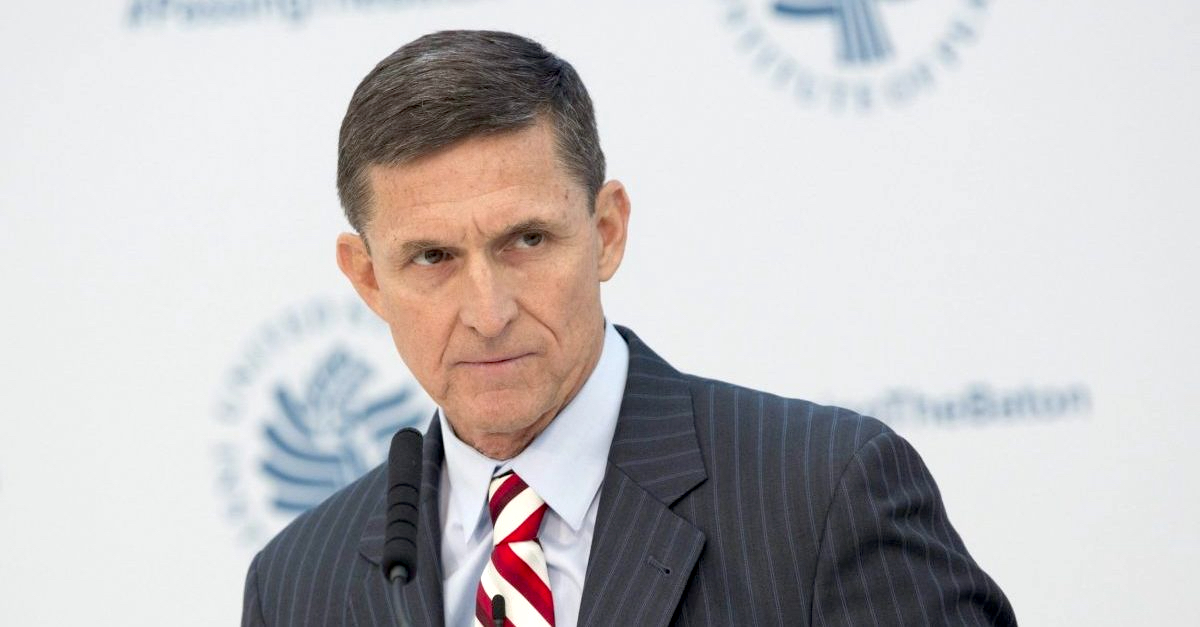
Michael Flynn appears in a file photo speaking at a conference in Washington, D.C., on January 10, 2017. (Photo by CHRIS KLEPONIS/AFP via Getty Images.)
Former Donald Trump National Security Advisor Michael Flynn will have to turn over documents related to the Jan. 6 attack on the U.S. Capitol Complex. Flynn is one of many Trump allies who sued Nancy Pelosi and the U.S. House of Representatives in an effort to evade discovery requests issued by the House Select Committee as part of its investigation into Trump’s involvement in the event.
U.S. District Judge Mary Stenson Scriven, a George W. Bush appointee, denied Flynn’s last-minute motion for a temporary restraining order on Wednesday. Judge Scriven’s six-page order against Flynn reads like a lengthy reprimand. Flynn’s motion for temporary restraining order — filed just one day before he was due to provide evidence in the Committee probe — was deficient on multiple fronts ranging from the substantive to the procedural, the judge determined.
In the underlying complaint in the lawsuit filed on December 21, Flynn cast himself as something of conscientious objector:
Like many Americans in late 2020, and to this day, General Flynn has sincerely held concerns about the integrity of the 2020 elections. It is not a crime to hold such beliefs, regardless of whether they are correct or mistaken, to discuss them with others, to associate with those who share the same belief, or to ask the government to address such political concerns. Indeed, it is our fundamental Constitutional right to speak about and associate around political issues that concern us, and to petition our government about those grievances.
Flynn argued that unless the courts step in to protect him, he “faces the harm of being irreparably and illegally coerced to produce information and testimony in violation of the law and his constitutional rights.”
In his documents submitted to the court, however, Flynn never detailed the nature of that alleged harm. Rather, Flynn’s remarkably brief six-count certification contained a simple denial upon which to base his protestations.
“I did not organize, speak at, or actively participate in any of the rallies or protests in Washington, D.C. on January 6, 2021, and I did not participate in the attack on the United States Capitol that day,” Flynn said.
On the same day the lawsuit was commenced, Flynn also filed a motion for temporary restraining order. It asked that the U.S. District Court for the Middle District of Florida halt the Committee’s discovery requests and allow him to avoid both a deposition and the production of documents.
Judge Scriven walked Flynn through the many problems with his request in her order Wednesday.
A party requesting a restraining order shielding them from discovery, explained Scriven, is expected to try and resolve the matter among counsel before involving the court. “Flynn has failed to comply with these procedural requirements,” wrote Scriven, referencing the Federal Rules of Civil Procedure.
Flynn did not submit a certification from his attorney describing efforts made to notify the House select committee of his objections. Rather, Flynn’s attorney submitted a certification in which he claims to have notified the committee verbally that his client would challenge the discovery demands.
“Notably, Flynn has not attached a copy of the ‘formal letter’ his counsel sent to the Select Committee,” Scriven pointed out. This lead the judge to conclude “there is no evidence that Flynn’s counsel provided any notice — through formal service or otherwise — of the motion for temporary restraining order.”
What’s more, there are some procedural requirements that emanate from naming Nancy Pelosi as the defendant in Flynn’s lawsuit — and Flynn did not follow the rules. The official caption of the case is Michael Flynn v. Nancy Pelosi, in her official capacity as Speaker of the United States House of Representatives, et al. However, remarked Scriven, “there is no evidence that Flynn’s counsel made any effort to provide notice to Speaker Pelosi, who is not a member of the Select Committee.”
“Flynn’s failure to provide the information required under Rule 65(b)(1)(B) and Local Rule 6.01(b) is fatal to his request for a temporary restraining order without notice,” the judge immediately noted.
Procedural defects aside, Flynn also failed to present any actual argument as to why the committee’s requests are unduly burdensome. For starters, pointed out the judge, Flynn was initially required to provide documents by November 23, 2021. He was later given an open-ended extension, and no new date has yet been set. Without an imminent deadline looming, explained Scriven, “there is no basis to conclude that Flynn will face ‘immediate and irreparable’ harm” warranting an emergency order.
Sriven’s denial of Flynn’s motion was without prejudice, which means he is permitted to refile the case should circumstances change. However, Scriven provided some advice to the former National Security Advisor: “If Flynn chooses to renew his request for a temporary restraining order, he must adequately explain why injunctive relief is necessary before Defendants have an opportunity to respond.”
Counsel for Michael Flynn did not immediately respond to Law&Crime’s request for comment.
Read the judge’s order below.
[image via CHRIS KLEPONIS/AFP via Getty Images]